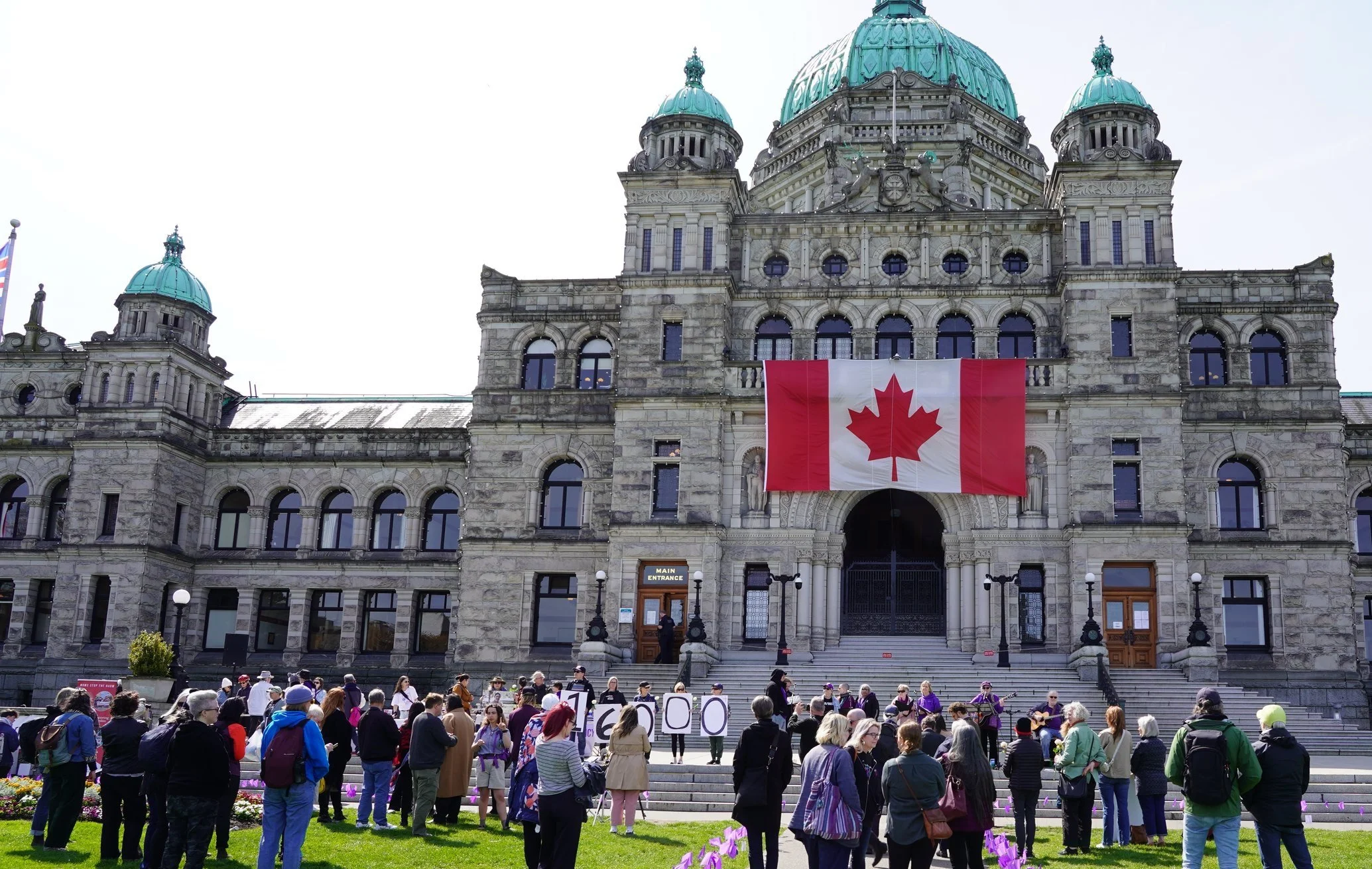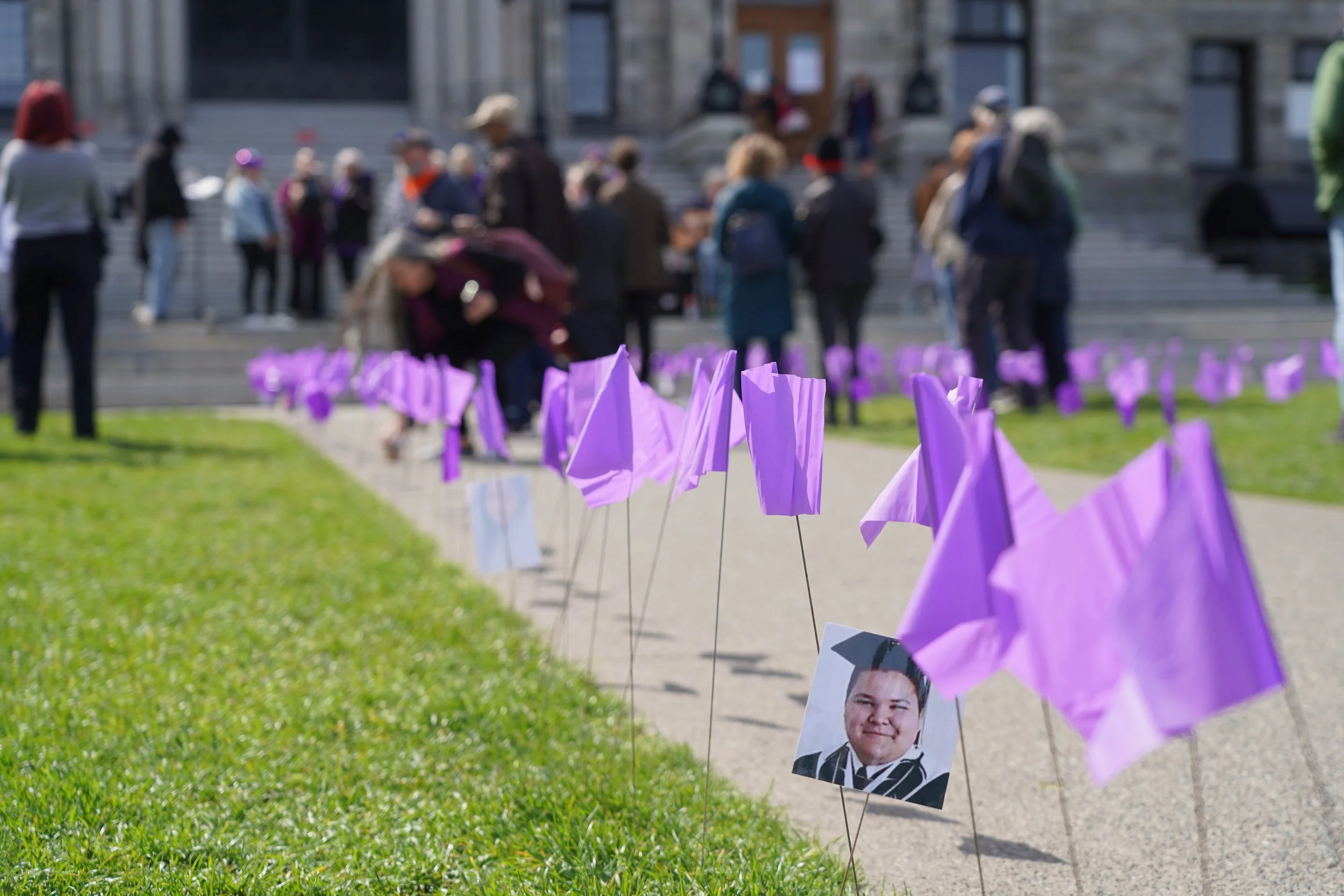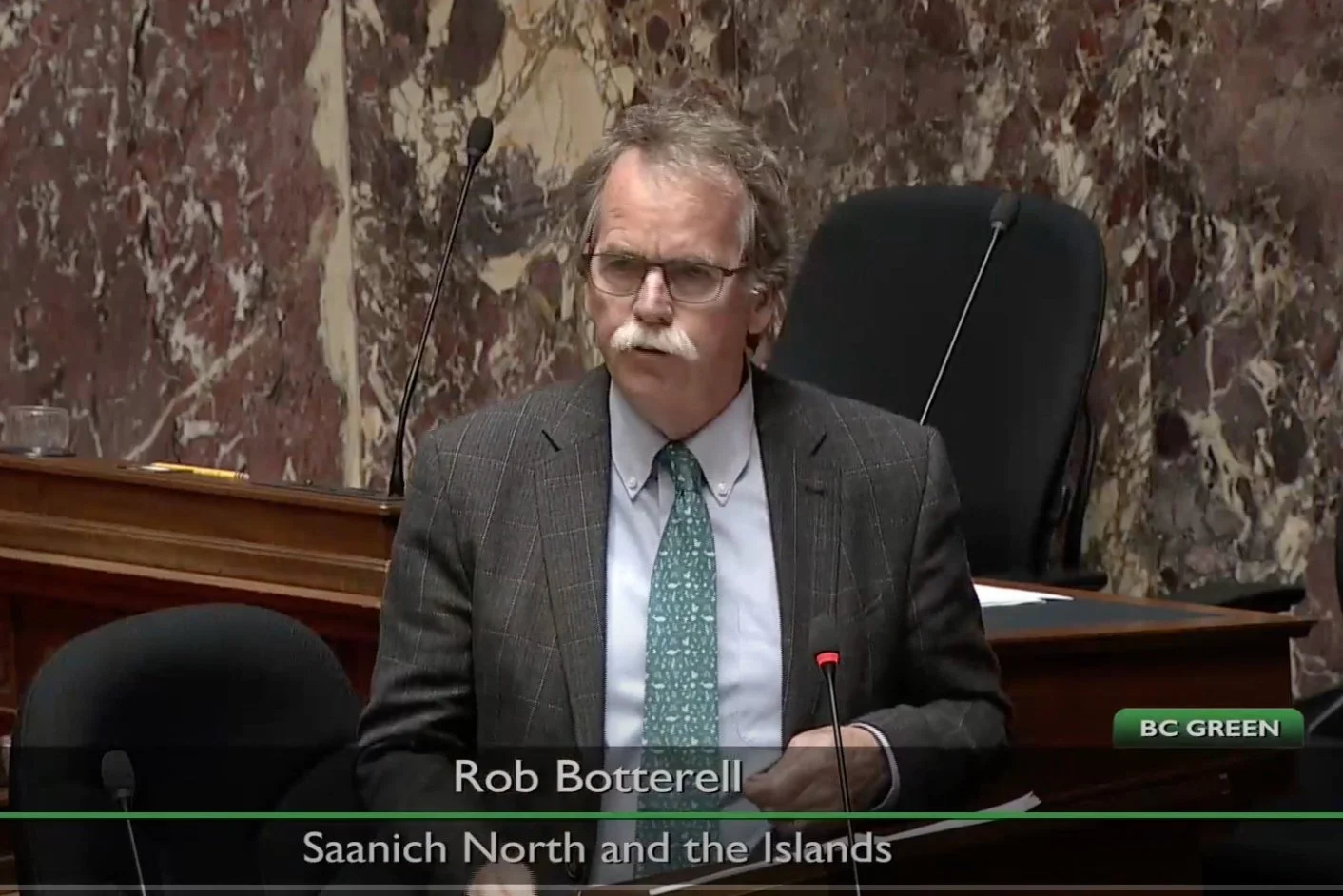MLA in ACTION – Issue #7
Week 1 – April 14 - 18
Photos: Amy Attas
Monday started with a meeting with the House Leader to discuss the upcoming week including timing for introduction of bills, continuation of budget estimates discussion. Amidst the regular legislative work, we took time to be on the Legislative lawn in front of the Legislature to join Mom’s Stop the Harm to mark the 9th year since the toxic drug crisis public health emergency was declared – Nine Years of Loss No End In Sight .
We listened to Lisa Lapointe, former BC Chief Coroner, Jess Wilder of Doctors for Safer Drug Policy, and Adam Olsen, our former MLA. Each spoke, reminding us that when the government wants to move quickly to address a crisis they do. It was very moving to be with mothers who have lost loved ones to this crisis, and I am so thankful for their courage, determination, and unwavering efforts to force government to take much stronger and compassionate action to finally resolve this crisis. This was also the day that Tamara Davidson, Indigenous member for North Coast–Haida Gwaii and Minister of Environment and Parks, brought forward the following motion:
That this House:
1. Acknowledges the findings of the Truth and Reconciliation Commission and the National Inquiry into Missing and Murdered Indigenous Women and Girls that cultural genocide occurred in Canada.
2. Recognizes this cultural genocide was born out of the Canadian government’s multifaceted attempts to separate Indigenous people from their land, culture, and languages and that residential schools were a key pillar of this strategy.
3. Recognizes that the remains of 4,000 Indigenous children remain buried in marked and unmarked graves at residential school sites across the country.
4. Recognizes that decades of legal precedent in Canada and British Columbia have affirmed the existence of Indigenous rights and title, which places an obligation on government to acknowledge, respect, and uphold these rights and title.
5. Accepts that the voices of residential school survivors, intergenerational survivors, their families, and communities must be at the centre of all discussions on the real and ongoing impacts of this tragic chapter of Canadian history.
We can never do enough to counter those who deny the realities of residential schools, who act with racism and malice toward Indigenous people across this province. In one of the wealthiest jurisdictions in the world, the life expectancy among First Nations people in BC has dropped by more than 6 years between 2017 and 2021. There is so much more work to do.
Several of us made speeches in support of the motion and you can view mine here. At the conclusion of remarks and debate, the motion was adopted unanimously by the Legislature.
On Tuesday, I continued with the committee review of Bill 7, also known as the Economic Stabilization (Tariff Response) Act. Committee stage is where members of the government and the opposition parties review each clause of an act one by one. We raise questions for the government to answer, and in some cases propose amendments. This is an important opportunity to create a public record of how the legislation is expected to work.
The remaining provisions of the act intend to give cabinet authority to amend laws to remove barriers to trade, give direction on goods or services to support Canadian sourcing, and establish tolls, fees, and charges in the province. The BC Green Caucus has serious concerns regarding openness, transparency, accountability, and legislative oversight. The amendments we’re proposing are intended to seek clarification from the Attorney General on whether sufficient checks and balances are in place.
A highlight of the day was the approval of an amendment proposed by the BC Green Caucus to promote greater openness, transparency, and accountability. The amendment requires that any requests by Ministers to government entities for changes to regulations affecting interprovincial trade in goods and the supply of services must be publicly disclosed. Committee stage discussions will continue until every clause of the Act has been reviewed.
Bill 7 is a big focus of my time at present, so much of Wednesday and Thursday was spent in committee asking questions. The Conservative Opposition and the BC Green Caucus (in this case, yours truly) are diligently raising questions. However, I must admit to feeling some frustration with the Conservative Opposition, particularly given that many of its members are lawyers with experience in legislation and its interpretation.
Whether it is repetitive questions on items that are not substantive, proposing amendments that they would reasonably know will be ruled out of order by the Chair, or asking questions like what dictionary was used to define a term in the legislation, it all takes up Committee’s time and wastes taxpayers’ money. We could be having much more substantive deliberations on the issues, section by section, that really matter. At one point in the proceedings I cast my eyes to the ceiling to see if the paint was drying. As a rookie MLA these antics are all new to me, but I must say I had hoped for better – Bill 7 may be the most consequential legislation we will deal with in 2025.
We were on break from the Legislature this week, which gave me a great opportunity to meet with constituents on housing and health care issues. One of the highlights was a detailed discussion I had with a constituent concerning expanding affordable rental housing on the Peninsula. As part of the overall solution, it’s clear we will need to remove or significantly reduce the land cost part of the housing cost equation. One option is to lease crown (provincial, federal, local government) lands, or land made available by churches and others to non-profits and other housing developers and providers. Creativity and collaboration amongst all levels of government and landowners will be a priority, and over the balance of 2025 I will be working to explore ways the province can support and facilitate affordable housing so those who currently work in our communities can also live here.
Week 2 – April 21 - 25
Through the week I met with lots of folks including:
Tara Stanford - just one of my amazing Salt Spring Island constituents
Mayne Island Housing Society – professional, passionate and unstoppable
Gayle Baker – ASK Salt Spring
Steve Wright – lots of informative lived experience with the Islands Trust
Alison Bond, Deputy Minister SDPR – Open to a new approach to an intractable issue
I would also like to include here an op-ed piece that will be circulating soon in local papers – a sneak peek, if you will!
Democratic and Electoral Reform
I appreciate the opportunity to voice my viewpoint. As with most public policy topics there are a wide range of views and electoral reform is no different. All perspectives, except those that disregard fundamental Canadian constitutional and human rights, deserve fair, full and respectful consideration.
Democratic and electoral reform is a subject under the Cooperation and Responsible Government Accord 2025 (CARGA) signed between the Green Party and the NDP. The BC Legislature recently established an all-party Special Committee on Democratic and Electoral Reform that includes four NDP, two Conservatives and me, as the sole Green.
The mandate of this Special Committee is broad and includes gathering expert advice and public input to:
Examine and make recommendations on:
a. increasing democratic engagement and voter participation, and
b. models for electing Members of the Legislative Assembly, including proportional representation.
The Special Committee is to report on these matters to the House by November 26, 2025.
Review the administration of the 43rd provincial general election, including consideration of the Chief Electoral Officer’s report on the 43rd provincial general election, and make recommendations for improvements for future elections. That report is to be delivered to the House by May 14, 2026.
British Columbia faces a long list of complex, interlinked challenges today – some would label it a polycrisis - US and Chinese tariffs, US annexation threats, a crisis of affordability for everything from housing to groceries, a lack of doctors, hatred, racism, residential school denialism, accelerating climate change, intractable poverty, ballooning deficits, stalled progress on the innovation and diversification needed to transition to a post-fossil fuel, green, diversified economy to name a few.
In the face of all these dramatic public policy challenges, why is democratic and electoral reform an issue in the CARGA and why should we have another review of proportional representation in BC?
My answer is that now, more than ever, we need an electoral system that fosters collaboration instead of polarization, builds consensus rather than division, follows rather than ignores science, and mitigates and eliminates the policy pendulum swings of majority governments elected by less than a majority of voters in a first-past-the-post system.
We only need look south of the border to bear witness to the unravelling of democratic institutions and electoral systems to know that in these times, the risks of authoritarianism are real.
While I personally support proportional representation, I will guide my work on the Special Committee with an open mind to considering all options, the best available expert advice and, hopefully, extensive community and constituency input. For me, much depends on the “how” of implementing democratic and electoral reform – options and approaches which cannot be easily explained because of their mind-numbing complexity are difficult to support, much less implement.
I have begun background reading to prepare for my committee work and have already come across authoritative articles that conclude proportional representation democracies, i.e. democracies where the electoral system creates a representative body that more closely reflects the public support for each political party, fare better in fighting polarization than majoritarian democracies.
There are several forms of proportional representation (PR): party-list PR, mixed-member PR, single transferable vote PR, among others. According to the British Electoral Reform Society, 130 countries in the world use some form of proportional representation while 55 countries continue to use first-past-the-post. Many of those 55 are former British Colonies like Canada.
Another key challenge is improving democratic engagement and voter turnout - particularly among those who have the most to lose and the most to gain – young people under 30. We need youth to “buy in” to democracy, rather than turning away if we wish to keep our democracy strong.
The BC Green Party supports a voting age of 16 as a way of increasing democratic engagement and higher voter turnout. I look forward to the research and public input on modifying the voting age.
Finally, in my view it is imperative that elections be administered with systems that meet the highest standards of integrity, transparency, accessibility, and procedural safeguards to avoid even the appearance of any voting irregularities. Public confidence in the administration of elections must be maintained so I look forward to reviewing the administration of the 43rd provincial general election and making recommendations, as needed, to ensure the highest standards continue to be the case.
Constituents in Saanich North and the Islands have a great deal of wisdom and lived experience to bring to the Special Committee’s deliberations on democratic and electoral reform options. I invite your participation in the public engagement portion of this review.
For further For further information and newsletters on my work as your MLA, please check out my website mlabotterell.ca.
Until next time,





